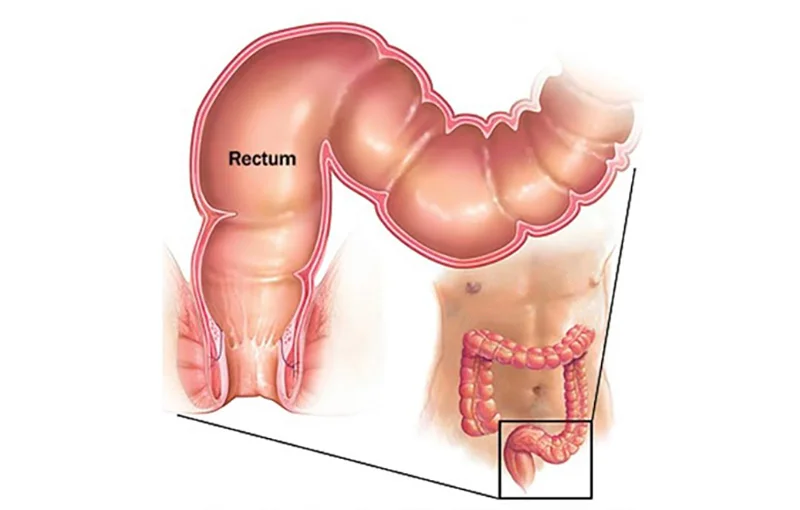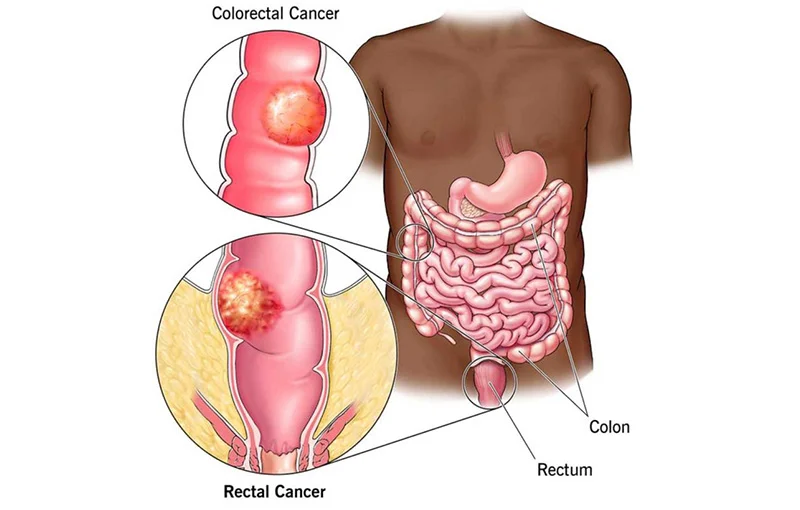Rectal Cancer Specialist in Ahmedabad
Around 10% of all cancer cases worldwide are colorectal cancer cases, making it the third most prevalent cancer overall and the second-biggest cause of cancer-related deaths globally.
Understanding Rectal Cancer
Location
Rectal cancer starts in the Rectum which is a last part of our digestive system that stores the digested food and then propel out of your body.
What is colorectal cancer, and how does it develop?
Any tumor is created when cells that line the organ begin to mutate and grow uncontrollably. The same thing happens with colorectal cancer and small clumps of cells called polyps develop. These polyps aren’t cancerous all the time, but sometimes can turn into colorectal cancer over time.
Polyps usually don’t cause symptoms, so colorectal surgeons recommend regular screening tests to look for polyps in the colon and rectum. Identifying and removing polyps prevent colorectal cancer.
What are the Major Factors Responsible for Rectal Cancer?
One of the major factors in the risk of colorectal cancer is obesity, along with food, smoking, and genetics.
- Age (mostly after 50)
- Ethnicity and race (some ethnic groups are more prone to colorectal cancer)
- Hereditary (Family history of cancer)
- Rectal polyps in the past, particularly if they were large, frequent, or demonstrated certain aberrant noncancerous cells (dysplasia)
- Previous history of colorectal cancer
- Inflammatory bowel disease (IBD), such as Crohn's disease or Ulcerative colitis
- Many hereditary disorders, like Lynch syndrome and familial adenomatous polyposis (FAP)
- High fat, red meat and/or processed meat
- Obesity
- Sedentary lifestyle
- Alcohol consumption
- Smoking or Chewing Tobacco
What are the Symptoms of rectal cancer
- Blood in stool
- Loose stools
- Either diarrhoea or constipation
- Feeling of incomplete evacuation
- Consistent stomach cramps, bloating, fullness, or pain that doesn't go away
- Unidentified appetite loss or weight loss
- Fatigue
These symptoms may also be brought on by other illnesses besides rectal cancer. Individuals should see their Colorectal cancer surgeon in Ahmedabad if they have any of these symptoms.
Diagnosis of Rectal Cancer
With the right diagnostic tools, rectal cancer may be identified and treated at an early stage.
There are several tests available to identify rectal cancer. To make a diagnosis, a combination of these tests may be required:
- Colonoscopy & Biopsy
- CT scan abdomen and chest
- MRI Pelvis
- PET Scan
- Blood CEA
Treatment of Rectal Cancer
Treatments for rectal cancer may be systemic, utilising medications to combat cancer cells throughout the body, or localised, focused on a tumour. The stage and severity of the cancer determine a therapy strategy.
A colonoscopy may be used to remove polyps or malignant cells from the intestinal lining in the early stages of rectal cancer treatment.
Surgery to remove part of the rectum, or sometimes entire rectum as well as adjacent lymph nodes may be necessary for advanced illnesses. These patients usually require radiation treatment before surgery to reduce size of tumour and local recurrence.
Immunotherapy, targeted therapy, chemotherapy, and radiation therapy are further treatment possibilities.
The most popular form of treatment for colorectal cancer is surgery.
The treatment modality of Colorectal Cancer depends on its stage and many other factors. To know the most suitable treatment for you, it is always better to get a expert opinion from a colorectal cancer surgeon in Ahmedabad.
Frequently Asked Questions
Hemorrhoids, diverticulitis, and cancer are just a few of the lower digestive tract problems that can be treated by a variety of surgical procedures known as colorectal surgery.
The majority of prolapsed internal haemorrhoids disappear on their own. Internal haemorrhoids that are significantly prolapsed or bleeding, however, may require surgical intervention.
Continent pain
Discomfort in the lower abdomen
Stool with blood in it
Modifications to bowel motions
Severe constipation or diarrhoea
Weight Loss
Prolonged fatigue


